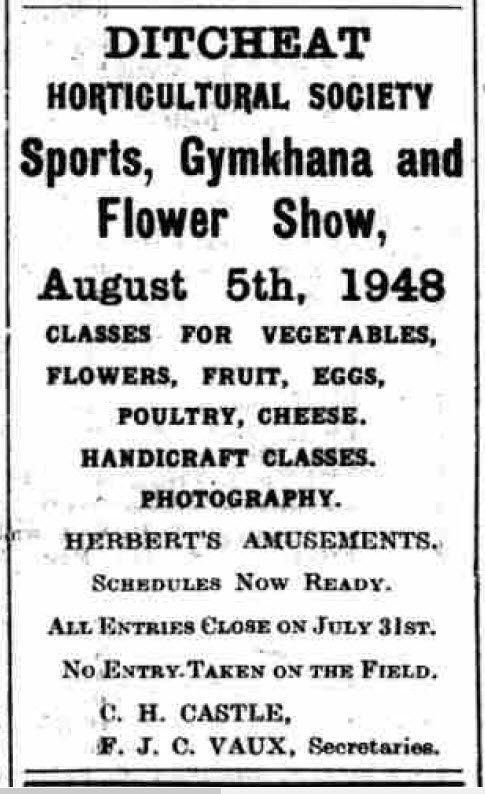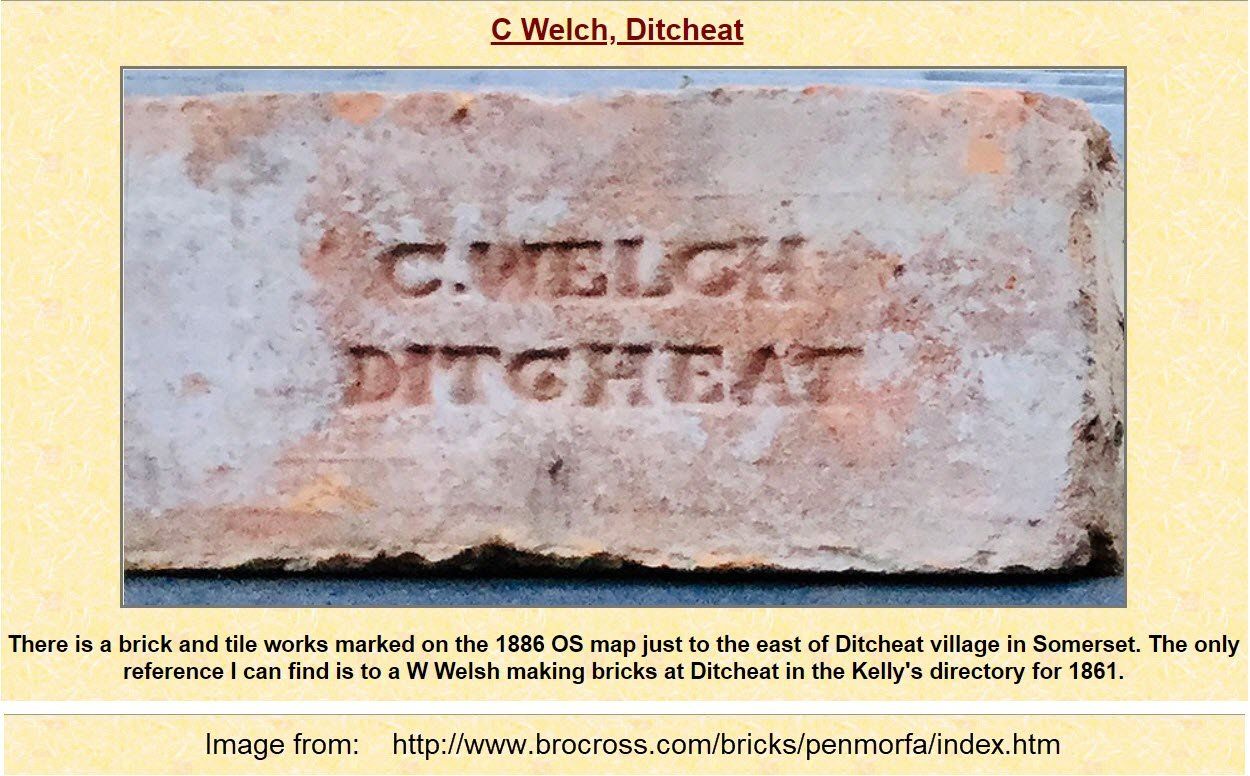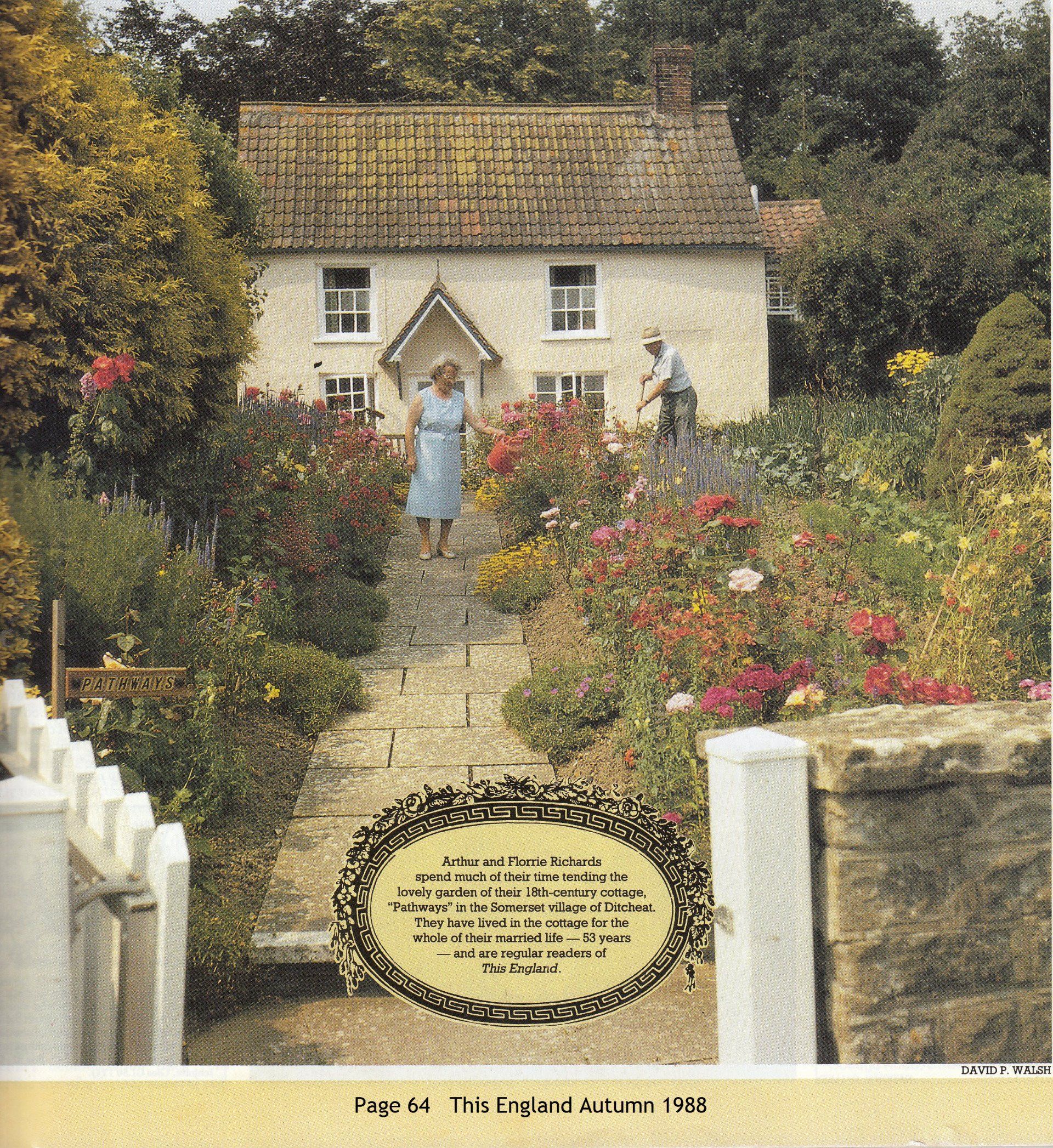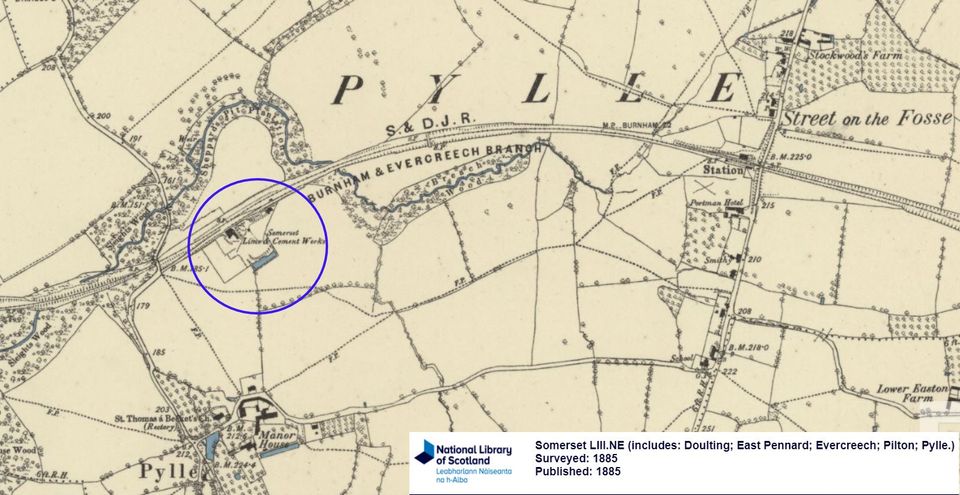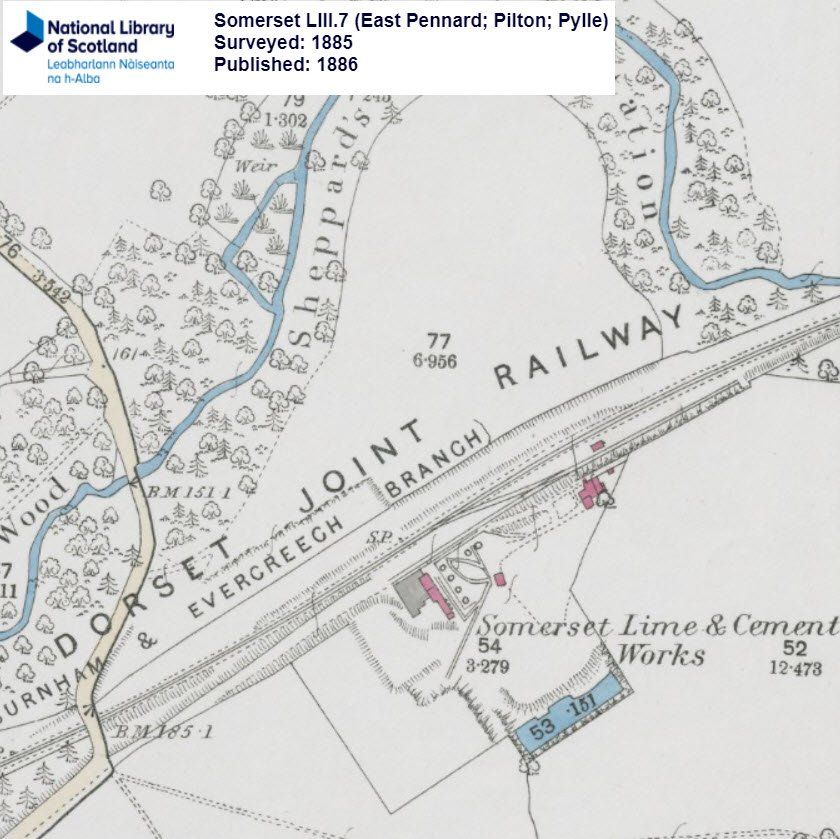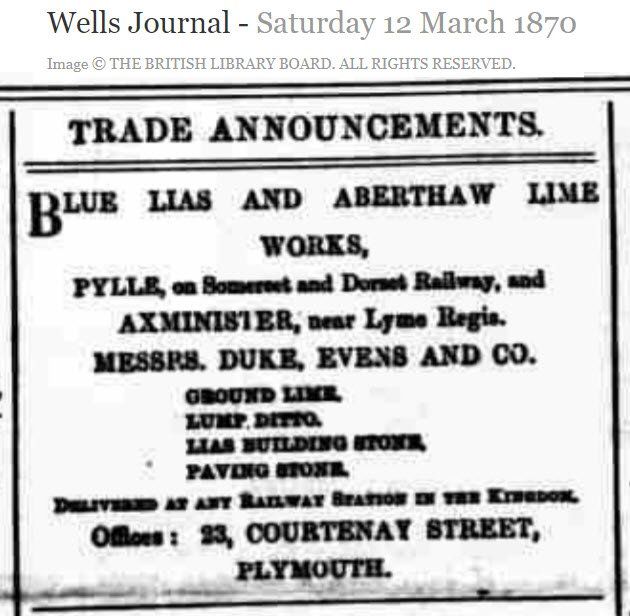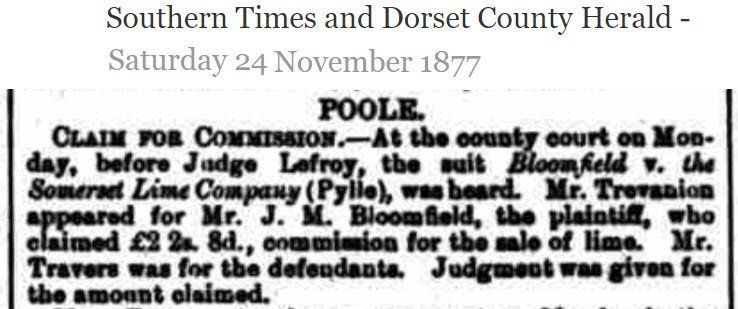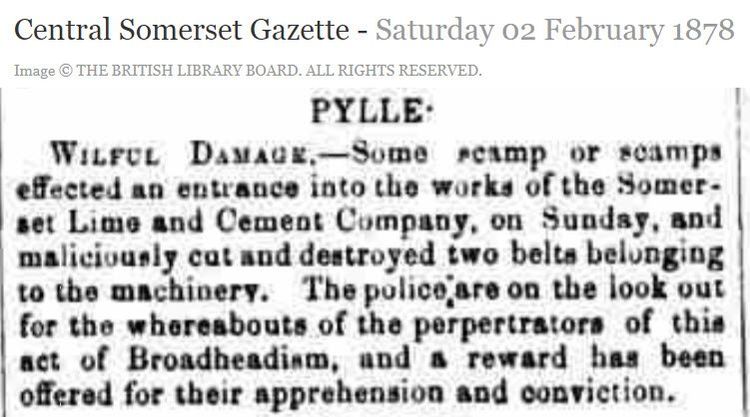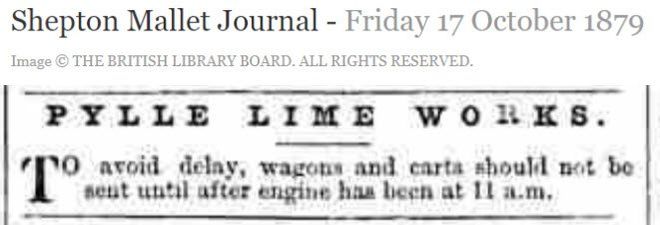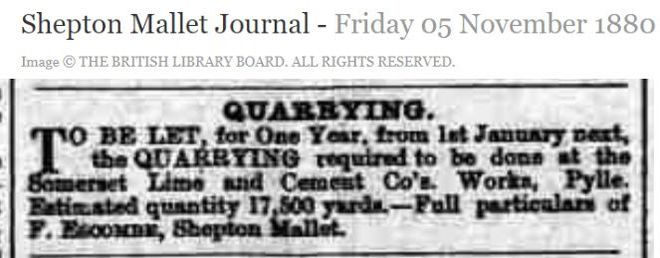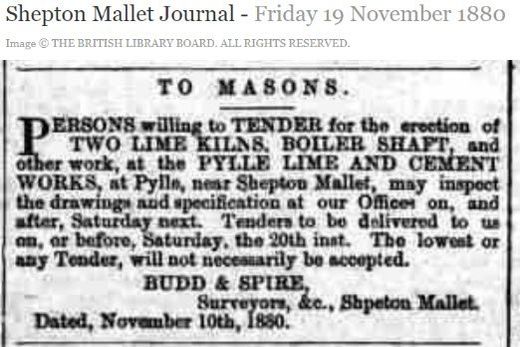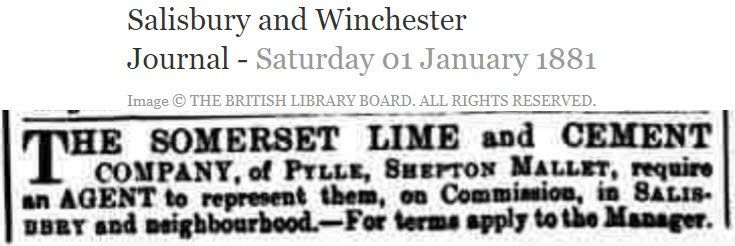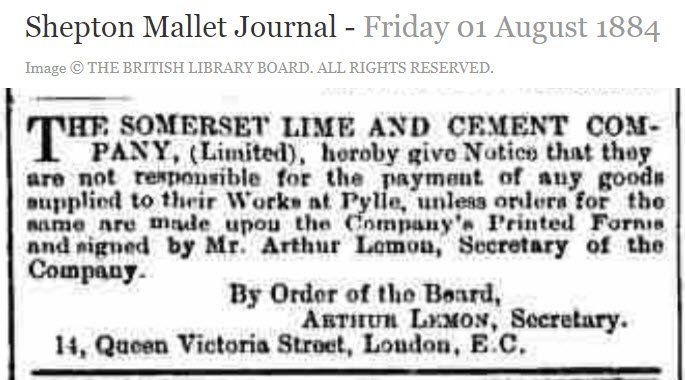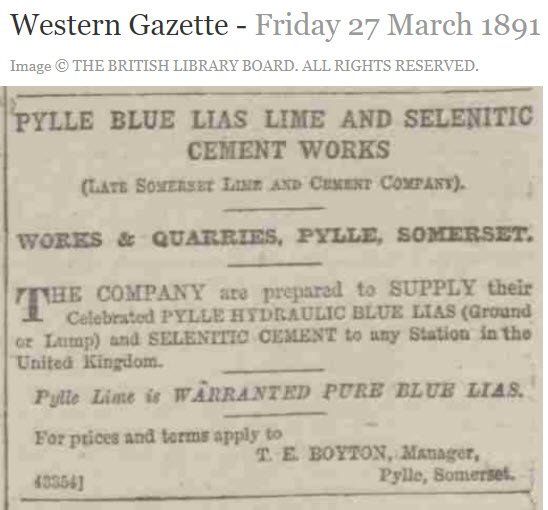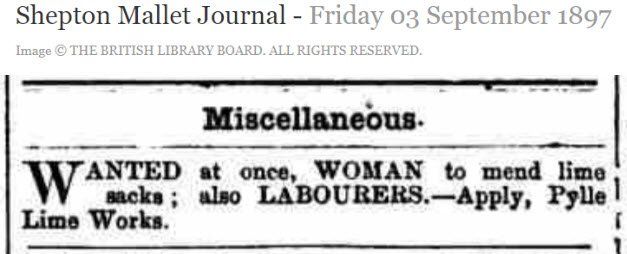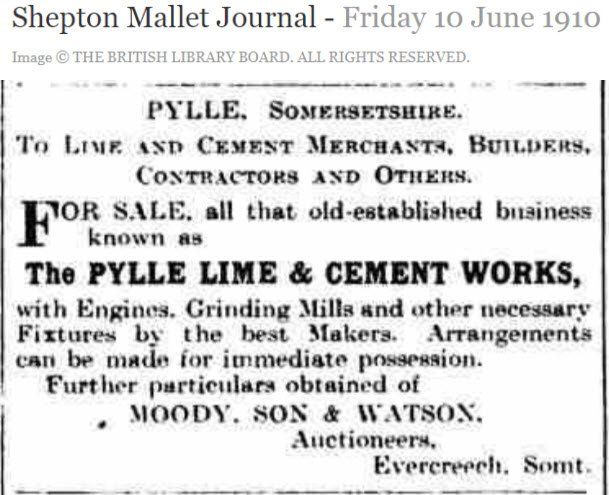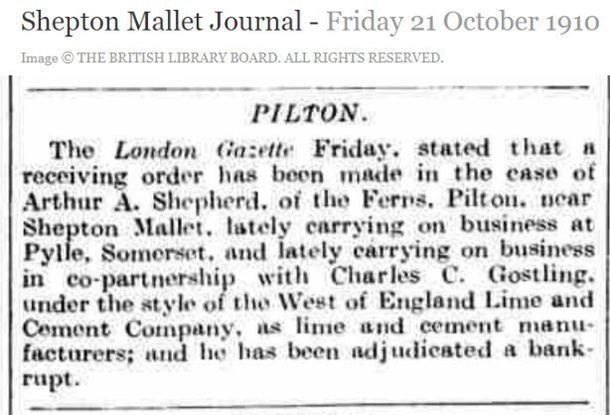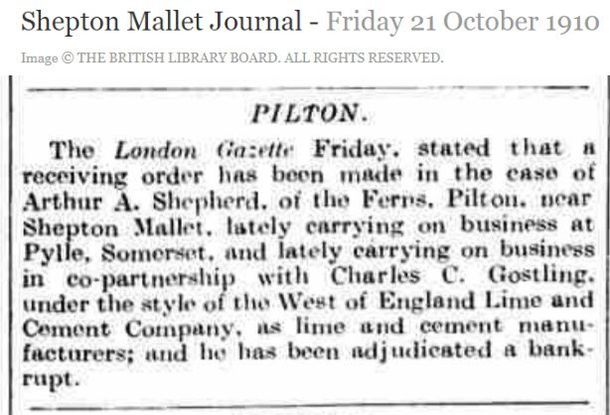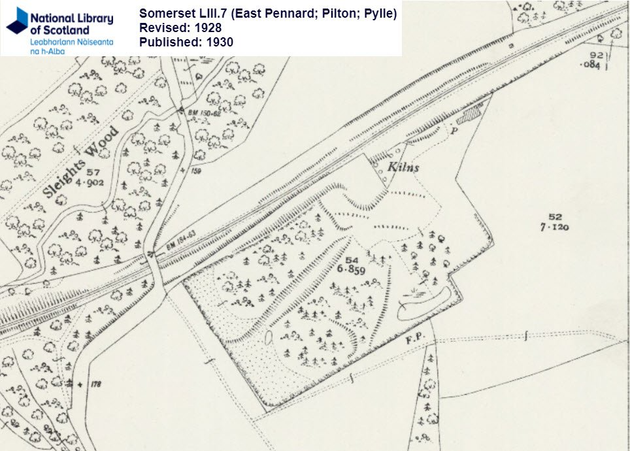Pylle Lime Works
Quarrying and lime burning was big business in Pylle
Wells Journal - Thursday 12 August 1875
Image © THE BRITISH LIBRARY BOARD. ALL RIGHTS RESERVED.
County Court, Wednesday.
Before R. A. Fisher Esq., Judge
Walter Garland. Pylle, v. Weedon. Claim £6 7s. 0d. for work done and materials supplied to defendant. Mr. Hobbs with plaintiff ; Mr. Davis, of Sherborne, for defendant.—Plaintiff deposed that he made some quarrying bars, hammers, and other things for the use of the lime kilns at Pilton, on the order of a man named Wall who was in the service of defendant, and who said defendant would pay him as soon the work was done.—Mr. Davis said the wrong party had been sued by plaintiff. as the lime kiln for which the articles were supplied and the work done was vested in the Pylle Lime Company, which was incorporated in 1874. Defendant occasionally visited the kiln in the capacity of a shareholder, but gave no order for and was in no way responsible for the cost of the goods supplied to Wall's order. It was also stated that some of the articles charged for had not been received.—Mr, Wm, Weedon, a merchant, residing at Exeter. deposed that he knew the quarries and limekiln in question which were worked by a company of which he was a shareholder. He produced the certificate of incorporation. He had never given orders to Wall individually for these goods.—Judgment for defendant.
Shepton Mallet Journal - Friday 29 August 1884
Image © THE BRITISH LIBRARY BOARD. ALL RIGHTS RESERVED.
SHEPTON MALLET PETTY SESSIONS.
Before Colonel E. B. Napier (in the chair), Major H. Ernst, Captain .Sherston, Messrs. E. H. Clerk and G. B. Napier.
THE CHARGE OF EMBEZZLEMENT AT PYLLE
At the Shepton Mallet Petty Sessions, on Friday, before Col E. Napier (in the chair), Major Ernst, and Mr. E.H. Clerk.
Frederick Jacobs, late manager the Pylle Lime Works, of the Somerset Lime and Cement Company, was charged for that he being servant of the Company, did on or about the 12th June last past, feloniously embezzle and steal a bankers’ cheque and order for the payment €4 5s 8d, drawn in favour of the Company William Garland, of Aldershot; also a cheque for the sum £13.17s from Messrs. Messer and Co., of Readiug; and cheque for the sum £9 18s 11d, from Jonas Nichols, of Southampton.
Mr. Welsh, of Wells, instructed Mr. Nalder, of Shepton Mallet, appeared for the prosecution, and Mr Hobbs, of Wells, for the defence.
Mr. Welsh, in opening the case, said that in November last prisoner was employed by the Company as sub-manager the Works, under Mr. T. J Hickes, at a salary of .30s per week. At the end of the month, the retirement of Mr. T. J. Hickes, he became manager, but at the same salary as before. On the 5th March,1881, the directors passed resolution that should receive, as from the 1st January this year £135 a year, and be was in addition to have the use of a cottage, and a piece of garden ground and some other little things. It was his custom to send, fortnightly, requests for the payment of the sums dueo for wages, and sum on account his own salary was included. These sums were taken by the secretary to Messrs. Roberts and Co., of London, and forwarded in cash to Stuckey’s Bank at Shepton. From whom prisoner drew it by cheque. As to monies received at Pylle, it was the custom to send the cheque on to the secretary in London, and prisoner sent vouchers to the persons paying them. Prisoner requested that he should have stamp to affix to accounts when sending them out. directing them to paid to the Loudon Office the Company. It was part of prisoner's duties to send to the Company early each month a list of accounts due to the company at the close of the preceding month, and in some some of these accounts which prisoner was charged with embezzling the cheques in payment of appeared. Lists persons who were to sued were placed in the hands of Mr Nalder the solicitor the company at Shepton Mallet, to collect, amongst them those named, and at the end of June prisoner stated that he had not received those sums, although it had been since ascertained that he had received and cashed the cheques about the 12th. They appeared in the list which he furnished to the Company's secretary on 17th July. He thought he should be able to satisfy the court that embesslement had been committed
Prisoner came into the employ of the Company in November, 1883,as sub-manager under Mr. T. J. Hickes. About the 21at November, 1883, assumed the managership, and the letters Which passed between the Company and the prisoner were put in, fixing the salary. The prisoner sent to the Company fortnightly requests for the payment of money for wages of the men, in which were included his own salary up till the 10th June. There was nothing in writing to show every detail of his duties—the manager would be supposed to know that. On the 30th December he wrote to relieved of the financial management of the works, and allowed to advise all accounts to be paid direct to secretary, and on the 9th January the board consented to this. This witness informed him of, on his calling at the office of tbe Company in London, and an india rubber stamp was forwarded to him. On the 27th of May the prisoner wrote to the secretary asking for £10 on account of his salary, but to this witness replied unofficially that as the request was not accompanied by a statement of account, the directors gave no instruction for payment. In another communication was asked to submit a statement of his petty cash payments, and travelling expenses. It was the prisoner’s duty as manager, to submit to witness at the end of each month a statement of all debts.
Western Gazette - Friday 17 October 1884
Image © THE BRITISH LIBRARY BOARD. ALL RIGHTS RESERVED.
EMBEZZLEMENT AT PYLLE - Frederick Jacob, on bail, was indicted for embezzeling bankers' cheques and orders for the payment of £4 1s 8d, £13 7s 8d, and £9 18s 11d, received by him on account of the Somerset Lime and Cement company Limited his employers, at Pylle, on or about the 12th of June. -Mr. Poole and Mr. Hamilton prosecuted, and the prisoner was undefended. - the prisoner was found guilty, and the Court passed sentence of nine months' hard labour.
Shepton Mallet Journal - Friday 17 July 1885
Image © THE BRITISH LIBRARY BOARD. ALL RIGHTS RESERVED.
Wells County Court
Tuesday
Before His Honour Judge Metcalfe Q.C.
Somerset Lime and Cement Company v Thomas Watson.— Defendant did not appear. The representative of the Company appeared, and said the debt was contracted through the London agents of the Company ; defendant had not denied having the goods, and had returned the empty sacks.—His Honour: You must prove received them. The case was adjourned.
Bridport News - Friday 04 December 1885
Image © THE BRITISH LIBRARY BOARD. ALL RIGHTS RESERVED.
SERIOUS ACCIDENT
On Friday, a man named Attenborough, foreman at the Pylle Lime and Cement Works, met with serious accident. A trolley rope had got detached from the drum by which it was being lowered to the quarry, and he, believing the trolley to have been fixed in its position, went to replace the rope on the drum. The trolley started again, and the rope struck him across the leg, breaking it in three places. He was removed to the hospital, where it was found necessary to amputate it. He progressing favourably.
Central Somerset Gazette - Saturday 02 January 1886
Image © THE BRITISH LIBRARY BOARD. ALL RIGHTS RESERVED.
JURORS FINED.
Mr. W. Muller, coroner, held an inquest at the District Hospital on the body of John Attenborough, who died from the effect. of an accident at Pylle Lime Works. He was struck by a rope which slipped from the drum used to lower trollies to the quarry. and one of his legs had to be amputated. The jury returned a verdict of " Accidental death." The inquiry was delayed some time owing to the non-attendance of two tradesmen who had been summoned on the jury, and the coroner fined them each £2
Shepton Mallet Journal - Friday 05 November 1886
PYLLE,
Accident at a Quarry. —Early on Saturday morning a number men were engaged in a quarry at Pylle, hoisting a block stone, which had been loosened by blasting, with a crow-bar, on the end of which plank was placed, and on this the men stood to prize the block up. It was bad morning for the work, and the plank slipped, allowing the crow-bar to fly back with the weight of the stone. It caught a man named Saul Lintern, of Ditcheat, under the chin, fracturing his jaw. He was at removed to Mallet Hospital, and though it was at first feared that the injuries were very serious, he progressing favourably.
Shepton Mallet Journal - Friday 05 May 1882
Image © THE BRITISH LIBRARY BOARD. ALL RIGHTS RESERVED.
LEAVING WITHOUT NOTICE.
Charles Stephens and Wm. Watch, two young labourers, were summoned Mr. Escombe, manager of the Pylle Lime Works, for leaving bis service without giving the requisite week’s notice.
Complainant stated that was manager the works in question, and proved that the defendants left his service on Easter Tuesday, without giving the proper week’s notice. On Easter Monday they visited the works—an improper proceeding—and took away their tools. They had no right the property at all that day. He hear of them next being employed on the sewage work in the town of Shepton Mallet. The defendants, who received 12s weekly, were summoned for that amount each. An amount of 7s 6d was due to Stephens and 7s to Watts. They were to have an increase of wages at the end of the week—2s 3d a day. They had not, however, applied for the money that was due to them. He had a large number of men employed at the works, and if they left without giving notice it would a serious matter in carrying on business.
Stephens complained that Mr. would give a man the ‘‘ sack ” at minutes’ notice; but he (defendant) was informed the bench that the aggrieved party had his remedy in court of law.
Cross-examined by Stephen, Mr. Esccombe denied that he (Stephens) left the works in the previous summer without giving notice; in fact he did give notice. John Cleaves, foreman at the works, proved that was authorised the manager to ‘‘put men on,” and that they left the works and went on the sewage works without giving any notice. No agreement passed between them when engaged, but they had worked there before, and knew the rules. They were paid by the day, as when it was wet they could not work.
Fined 12s each and costs.
Allowed week for payment of the amount.
Shepton Mallet Journal - Friday 20 January 1893
Image © THE BRITISH LIBRARY BOARD. ALL RIGHTS RESERVED.
WELLS COUNTY COUKT.
Tuesday.
Before His Honour Judge Austin.
A GIFT, OR OTHERWISE.
Boyvton and Pegrim, v. Bisgrove.— This was a claim by a firm lime burners, of Pylle (for whom Mr. W. Muller appeared), who claimed £1 I9s 5d for lime supplied to Mr- Bisgrove. Station master at Templecombe, and formerly of Wincanton. A counter claim was filed for £2 3s 9d. commission claimed on the sale of lime. Defendant alleged that the lime, which was being claimed for was a gift to him. He had asked for gift of little lime for his garden, and the manager sent him on truck load, for which he charged him. He told him that that was too much for the small garden he had, and the manager then said that he would send him on some rough lime that had ,and which he could sell for manure and repay himself. He claimed the commission as an agent for the sale of the plaintiff’s lime.
Mr Muller said there was a company called the Somerset Lime and Cement Company at Pylle, to whom the defendant was an agent. Their business was,. however, sold early in 1891, by the voluntary liquidator to the defendants. Defendants counter claim was for commission on lime supplied by the old company, whilst the plaintiff’s claim was for lime supplied by the new company. Defendant had an idea that he could bring the old claim for commission against the new company, when in reality it should have been sent to the liquidator.
Mr Bisgrove said that he was dealing with the manager, Mr. Boyton, and did not know whether he was the principal or not, especially he as he received letters from the firm in the same name.
Mr. Muller said that the new company, the Pylle Blue Lias Lime and Selenitic Cement Works Co., merely bought the works The debts would collected by the voluntary liquidator. ,
Correspondence between the parties was put in, and it appeared that Mr. Bisgrove had admitted the debt under the mistaken impression that he could only in that way bring his counter claim.
His Honour gave judgment against Mr. Bisgrove on both claim and counter claim.
A private communication took place between defendant, His Honour, and Mr. Muller, as to payment, and payment was ordered at 5s per month.
Shepton Mallet Journal - Friday 17 May 1895
Image © THE BRITISH LIBRARY BOARD. ALL RIGHTS RESERVED.
SHEPTON MALLET PETTY SESSION.
FRIDAY
Before Major H. Ernst (in the chair), Capt. J. D. Sherston, Messrs. J. Spencer, F. Spencer and A, L. Phipps.
DOG LICENSES.
John James Farrance, lime manufacturer, of Pylle, was summoned by Alfred S. Knill, excise officer, for keeping dog without a license; on April 6th. Mr. Chambers, supervisor of excise, appeared with Mr. Knill, division officer, to prosecute, and Mr. Calder Woods defended.
P.C. Cooper said that Saturday, April 6th, at 2.15 p.m., was on duty close to Pylle Lime works in the parish of Pylle, and saw a spaniel dog. He went to defendant and asked if he owned the dog and had a license. He replied that it was his dog, but had not got license as the dog was not six mouths old till next week. Witness told him that the dog was more than that. He had seen the dog, which was about 10 months old, on the premises ever since October last.
By Mr. Woods : He did not mistake the dog for the dog’s mother. He had ascertained that the dog was the same that he saw in October.
Mr. Woods for the defence said that the dog was not more than six months old at the time the constable called. Mr. Farrance had the dog in October last a young puppy, direct from the mother. He took out the license within a couple of days. The dog became of licensable age at the end of April. No caution had been given to the defendant. The Bench gave defendant the benefit of the doubt, and dismissed the case.
Shepton Mallet Journal - Friday 29 November 1895
Image © THE BRITISH LIBRARY BOARD. ALL RIGHTS RESERVED.
UNJUST WEIGHTS.
Messrs. Farrance and Boyton, Pylle lime works were summoned by Mr. Nathan W. Crick, inspector of weights and measures, for having in their possession on October 16tlh, a weighing and two 56lb weights which were unjust. Mr E. H. Roach (Davies and Roach, Wells and Glastonbury), appeared to prosecute, and Mr. Pomeroy, from the office of Mr. A E Nalder, Shepton Mallet, defended.
Nathan W. Crick, inspector of weights measures, said that he attended Evercreech in July, and August, 1893. He sent notice to the defendants On July 29th received letter from the defendants stating that they had only one weighing machine to weigh up 4 cwt and one weighing machine for trucks which was out of order and not used. He replied, calling attention to the necessity for the weighing instruments to be stamped. On August 4th he received a letter stating that the weighing had a dead weight over 2 cwt. and that and engine could seen at the works, He replied to this that the machine could not be over one cwt dead weight, as it was of ¼cwt capacity, and should be brought to him. In September 1894 again notice was given, but no weights or machine was sent him. He attended the works on October 14th last, and saw the machine, which was a 3 cwt sack machine. Mr. Farrance said it was used for weighing sacks of cement. He tested the machine which was much broken and out of order, and found it 1½ lbs, against the purchaser at 1 cwt. Defendant said he was glad it was not other way on. He tested the weights there, and found 2 half-cwt weights were, one 2 ounces and the other 3 quarters of an ounce light.
In reply to the bench Mr. Crick stated that he took the earliest possible opportunity of visiting places where the weights were not sent to him on his periodical visits.
Cross-examined by Mr, Pomeroy: I did not give the defendant to understand that the weights were against the seller. I told him they were against the buyer. I state positively that I did not say the contrary on that occasion, and that to that defendant made the reply. There were two other newer ½-cwt weights bearing my recent stamps. I did not consider the discrepancies small. I offered to have the weights adjusted if they could be adjusted. Defendant stated the machine was used for weighing cement.
Re-examined : I found that the weights could not he re-adjusted.
Mr. Pomeroy contended that the offence was a trivial one. There was some misconception on the part of his clients as to his duty in regard to taking the weights to the inspector. They took over the weights and machine with the business, and the weights had not been used for some time, having been replaced. He denied that the inspector said that the machine was against the buyer. The remark of the defendant was made under the impression that it was against themselves.
The bench considered that the case was proved, and fined defendant £2 and costs ; on a single cwt it may not he much deficiency, hut on larger quantity, it would he considerable.
On the application of Mr. Roach, the weights were forfeited, and the machine ordered to be adjusted within seven days.
Mr. Pomeroy stated that there was no necessity for that as the machine had been replaced.
Mr. Roach : It must be distinctly understood that the machine must not be found on the premises should the Inspector visit there again.
Mr. Pomeroy accepted the condition.
Shepton Mallet Journal - Friday 03 September 1897
PYLLE The employees of Messrs. Farrance and Boyton, of the Pylle Lime Works, numbering about 30, with their wives, had their annual outing on Saturday last, to Portsmouth, and after spending a very enjoyable day they reached Pylle station about twelve o’clock.
Shepton Mallet Journal - Friday 31 July 1903
Image © THE BRITISH LIBRARY BOARD. ALL RIGHTS RESERVED.
WELLS COUNTY COURT
FRIDAY Before his Honour, Judge M.V. Austin
A PYLLE DISPUTE.
Frederick Kilby v. Farrance and Boyton.— This was a claim by the patentee of certain lime kilns, against Messrs. Farrance and Boyton, lime burners of Pylle and London, for damages, for their having broken and entered a house rented by him of them at Pylle, where he resided when manager for them. —Mr. F. O. O. Chubb, solicitor, of Wells, appeared with the plaintiff, and Mr. Douglas Metcalf, barrister of the Western circuit, instructed by Mr. A. E. Nalder, of Shepton Mallet, for the defendant company.— The particulars of claim alleged that on or about the 18th May last the defendants did trespass by wrongly breaking, entering and taking possession of a dwelling house and premises, at Pylle, of which plaintiff was then in occupation as tenant, and also that the defendants did, on or about the same date, wrongfully seize and carry away therefrom the household furniture and other goods and effects of the plaintiff, and still detained the same, and defendant claimed by way of damage the sum of £25, less credit for a half year’s rent, £5/4/-, and a sum of £1 due from him to the defendants, making the net amount of claim £19/16/-. The defendants counter-claimed for £8/18/6 for an omission of an entry on the debit side, of a book kept by him as bookkeeper to the defendants, by which the cash balance for which he was responsible was increased by that amount. —Mr. F.O.O. Chubb opened the case.—Frederick Kilby, the plaintiff, stated that he was patentee of a certain kiln, and had been engaged in the business for years. He had been in Messrs. Farrance and Boyton’s employ as manager, not as book-keeper. He kept the books, and he took the house in March, 1902, at £2/12/0 a quarter, coal and oil free. He put in letter from Mr. Boyton of April, 1902, showing that he was not book-keeper, but manager for the manufacture of cement. September 8th he had some communication as to the tenancy ; on September 22nd he gave notice to leave in March. He settled up the rent to September 29th. He then withdrew the notice. It was not true that he was going to give up possession of the cottage in October. They settled the cash account. He offered £3/4/0, deducting his wages on two occasions, Mr Farrance refused it, and put the “bums” in. Witness immediately paid them out. He wrote to them on that, withdrawing the notice, and had no reply. Nothing more occurred till February, when he was at Seaton Carew. He had left the employ of Messrs. Farrance and Boyton in July, 1902. It was part of the agreement for the erection of his patent kiln, that the kiln should be shown to any possible customer, and they had it free of royalty on that account. He kept the cottage on for the sake of meeting customers there. February he received letter stating that the door was open, but on communicating with some one at Pylle he found this was untrue. Later he found the furniture was removed. He wanted the cottage for the sake of his kiln business, and all his note paper was headed. “Pylle, Somerset.” He had not received his furniture yet. He valued it at £10. Cross examined: He did not know the date of the letter which Mr. Nalder stated that the furniture would handed over to anyone appointed by him. The Judge held that the rescinding of the notice must be clearly and explicitly agreed to by the landlord.—In further cross-examination the plaintiff denied that he agreed to go out in a month’s time, instead of in March, He received letter in October stating that he had promised to leave the cottage in a month’s time instead of in March. The cottage was within the works, and close to the office. A kitchen and two bedrooms were furnished. The things were worth £10. An inventory was put and examined the plaintiff. As far as he could recollect it was about right. He went away from the cottage about the fifth of December. He had not lived in the cottage ever since. He left his furniture there without going near it from December to May. He could not tell if the front door was open, for was three hundred miles away. He saw the furniture on Sunday morning last. It was not in the house, hut in an old whiting shed. He could see it through the window. He did not ask to look at it, as his brother had been refused. He was not book-keeper, but he kept the books as matter of convenience.—The Judge: Did you keep the money ?—Witness: Yes.—By Mr. Metcalfe He always kept the cash, because on one occasion Mr. Farrance went to the safe and took the money. —The Judge : He had a right to steal his own money.—Plaintiff: More than one had access to the safe. A letter of the 21st September was put in, in which complaint was made of his carrying the office cash in his pocket. He did not remember Mr. Farrance drawing a cheque £10 for wages for Evercreech in February last year, and keeping £l/1/6, and giving witness the balance of £8/18/6. The entry to that effect was in Mr. Farrance’s writing. Mr. Farrance paid the wages, and should have made the entry on the other side. He never once paid the wages whilst he was there ; the whole of the entries there were in Mr. Farrance’s writing. In reply to the Judge, Mr. Metcalfe said that the books were audited in July this year, when this was detected.—After hearing further evidence, his Honour gave judgment for £10/5/-, to be reduced to 5/- on the return of the furniture, on the claim, and for the defendant for £6/4/-,without costs, on the counter-claim,this being the amount admitted.
Shepton Mallet Journal - Friday 18 November 1910
Image © THE BRITISH LIBRARY BOARD. ALL RIGHTS RESERVED
£600 GONE 3½ MONTHS.
Arthur Alfred Shepherd, residing The Ferns. Pilton, near Shepton Mallet, Somerset, and lately carrying business in co-partnership with Charles Cubitt Gostling under the style or firm of “The West England lame and Cement Company,” at Pylle. Somerset, as lime and cement manufacturers, came up for his public examination. The debtor's statement affairs allowed gross liabilities £129/16/4, due to two unsecured creditors, and assets (as stated by debtor), bicycle, estimated to produce £l/5/-. and one bad book debt £110/4/9, estimated produce nothing; leaving deficiency of £l28/11/4. The cause failure as alleged by debtor was the failure of my late partner to discharge the partnership liabilities agreed under the deed of dissolution, dated the 11th October. 1909.” He alleged that had execs of assets over liabilities the 10th day June, 1909, £887/9/5, his income since 10th day of June, 1909, viz., drawings as partner in the West England Cement and Lime Co. —10 weeks at £3, was his loss in connection with his partnership with C. C.Gostling was amount paid to Charles Cubitt Gostling £600. less amount to be paid to him on dissolution of said partnership when he retired from business £105, paid law costs connection with partnership £l4/12/1. paid for alterations and decoration to The Ferns, Pilton £2l/0/9, paid for removal of furniture from Lewisham to Pilton ,£33. liabilities (included in statement affairs) which should have been discharged by his late partner under the terms of the partnership deed £129/16/4, loss in respect premiums on endowment policies £9/3/2. The Official Receiver’s observations were :—“The receiving order was made on the 10th October, 1910, on the debtor’s own petition. He was adjudged bankrupt the same day. The debtor (aged 46) entered into partnership the 11th June, 1909, with Charles Cubitt Goatling, of Pylle, Somerset, where they carried on business under the name of The West of England Lime end Cement Company.” The debtor put £600 capital into the business, i.e., £500 for a half-share of the plant and goodwill and £100 towards the working capital. The partnership was dissolved on the 11th October, 1909, by mutual consent, Mr. Gostling taking over the liabilities and assets, and agreeing to pay the debtor £105 by instalments of £6 per month. No payment on account of this sum has been made to the debtor, and the amount, together with interest £5/4/9, is estimated in the statement of affairs to produce nil. The dissolution was duly gazetted. Gostling appears to have carried on the business until Christmas. 1909. when he left Pylle, having previously disposed of the assets. The debtor has furnished the Official Receiver with an address in London at which his late partner may found. The books of account kept were cash book, creditors’ and debtors’ ledger, sold day book, and sack account book, which the debtor states were left with his late partner on the dissolution. The debtor states that he became aware of his insolvency in February last, when was sued for the two partnership liabilities shown in his statement of affairs. He alleges that the firm was solvent when he retired from it on the 11th October, 1909, and produced a rough balance sheet, which he made out for his own information about the end of September, 1909. This balance sheet shows liabilities £242/11/9 anti assets £385. The debtor states he does not know what liabilities, if any, his late partner has discharged. The debtor states has never possessed any household furniture. The whole the household furniture and effects the debtor’s address is claimed by debtor’s father-in-law. with whom, debtor states, has lived since his marriage. The father-in-law is tenant of the premises. The two items shown in the deficiency account for alterations and decorations the Ferns, Pilton, and the cost of the removal of the furniture from Lewisham to Pilton were paid by the debtor because he states it was for his (the debtor’s) convenience his father-in-law took lease of the premises and had the furniture removed to Pilton. The claim to the furniture is being investigated. The debtor’s life was insured in the Scottish Widows’ Assurance Co. for £300 and in the British Equitable Assurance Co. for £100. He states surrendered these policies to the respective companies in or about May and July last for £30and £11 respectively. These sums were expended him in living. He has had no occupation since 11th October, 1909.—In reply to the Official Receiver the debtor confirmed the particulars given above. The expenses of removal were tor his father-in-law’s goods—as his .father-in-law was moving for his benefit he considered it only right that he should pay the cost removal and the other incidental expenses. He had never had any furniture his own. He paid for a half share in the business. He found he could not work, and would not work, with the other man, and sold out his share on October 11th 1909. the agreement being that the partner would pay all the liabilities and give him £lO5. His late partner left the place before Christmas, and the present claim was in respect of partnership debts which Mr. Gostling had not paid according to the agreement. As a matter of fact had lost his £600 in three and half months, and in addition this claim was made against him. He made the ordinary investigations before going into the partnership, and found that an increasing business was being done. He had endeavoured to find Mr. Gostling, but could not succeed. —The Official Receiver said that the address which had been furnished him had failed to find Goatling. A few questions were asked by the Registrar as the investigations made by debtor and his father-in-law prior to taking over the business, and the examination was then allowed to close subject the signing of the notes.
This appears to be the end of quarrying and cement production in Pylle , the 1928 OS survey shows the railway siding removed and the quarry returning to wild.
There were numerous small Lime Kilns in the locality, examination of the old maps show them at Lamyatt, Stoney Stratton, Maesdown Hill, Beard Hill, Evercreech (on the now Bath & West Showground), The works at Leighton Lane, Evercreech alongside the railway line were later coming on stream circa 1890, these works probably saw the decline of the small works in the area.
The Pylle Lime works appear to be the only producer of cement from this group of local sites. The website www.cementkilns.co.uk/cement_kiln_pylle has more details of cement production at Pylle.
